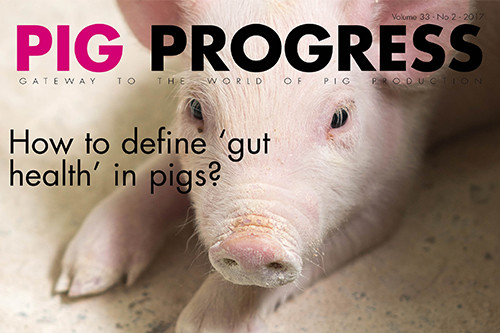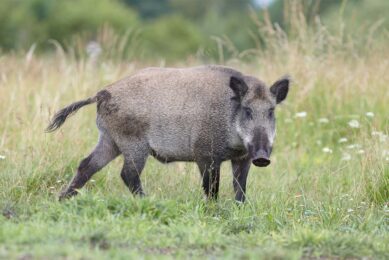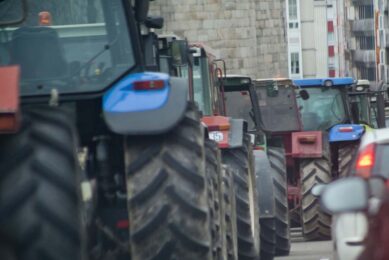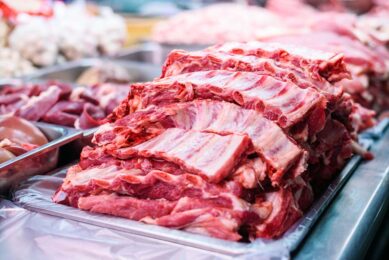Latest issue of Pig Progress: How to define gut health?

The 2nd edition of Pig Progress of 2017 dives into the question How ‘gut health’ can be defined? We turned to Denmark to find an answer.
Dr Charlotte Lauridsen of Aarhus University, Denmark, gave an insight into her opinion of ‘gut health’ and in this context introduced the concept of ‘resilience’. In her view, a gut is not something static, but it should always be kept in mind that it is dynamic and constantly changing.
The article on Page 6 is a summary of the presentation she gave at Pig Progress’Healthy Guts, Healthy Piglets seminar/webinar at EuroTier 2016 in Hanover, Germany.
How to keep just-weaned piglets healthy?
The theme of ‘health’ comes back in a host of other articles in this edition as well. For young, just-weaned piglets to stay healthy, there’s a wide array of solutions possible. In those countries where the usage of antibiotics is actively being discouraged, sometimes the use of zinc oxide is widespread.
Now for environmental reasons, the use of zinc oxide is under scrutiny too in the European Union. This may not have to be such a big problem, argue a group of British researchers from AB Nutrition. Read the article on Page 24.

Health issues & minerals
What minerals and health have in common is explained in a contribution by Kevin Perryman, from Selko Intellibond International Business, a Trouw Nutrition brand. This article states that, the addition of more minerals to piglets is only successful when the biologically active metal is really absorbed into the bloodstream.
Optimised health and performance are a result, the author writes. Read more on page 28.

Health issues & Nutriad
At feed additives company Nutriad, headquartered in Belgium, they choose to speak of digestive performance when referring to the well-being of the gastro-intestinal tract. Pig Progress met up with the company’s CEO, Erik Visser, and learnt about the change the company has gone in the last few years.
Under Mr Visser’s guidance, Nutriad has grown strongly – and the company is likely to grow further. He explains the importance of a brand inspiring confidence. See Page 12.

Health and climate
It’s not only the gut that determines a pig’s health – so does the environment the animal is in. Ventilation company Stienen BE, headquartered in the Netherlands, has been working for some while to further improve its Aerox heat exchanger, to filter cold, incoming air by using warmth from the farm itself, thus optimising the internal pig house climate without many additional costs.
Since these heat exchangers also sometimes are affected by the weather, the company chose to use a plastomere, that continues to work even in cold circumstances. Pig Progress put on a thick coat and visited a pig farm in winter. The article can be read on Page 20.

Sow nutrition re-evaluated
Nutrition-wise, this edition features an interesting contribution from René Bonekamp, DSM Animal Nutrition & Health, who zooms in on further improvement of sow nutrition. With genetics continually enhancing, the requirements for sow nutrition cannot remain the same.
Sows can benefit from additional ingredients to support highly prolific production, he writes. Page 22
Boar feeding against castration
In Europe, they agreed to get rid of castration of boars by 2018, but real alternatives so far are yet to be found. Or aren’t they? Belgian-based feed company Dumoulin recently presented a novel type of feed (Page 8), which might be just that silver bullet.

Country in focus: Russia
Over the last few years, Russia has been heavily investing in its agricultural sector. For a long time, they aspired to be less dependent on imports, and with the recent trade bans with Europe and Northern America, that process appears to have been accelerated, see Page 10.
The right questions and correlation
Regular columnist John Gadd (Page 17) expands from last month’s contribution on how to smartly deal with company representatives, and how to find out which solution works for your farm.
In the same fashion, columnist Casey Bradley (Page 34) helps to point to the difference between correlation and causation. How to influence gut health is a ‘an interconnected puzzle of giant proportions’, and even when effects occur when using a certain solution, it doesn’t always mean that this was caused by that solution.
 Beheer
Beheer








 WP Admin
WP Admin  Bewerk bericht
Bewerk bericht